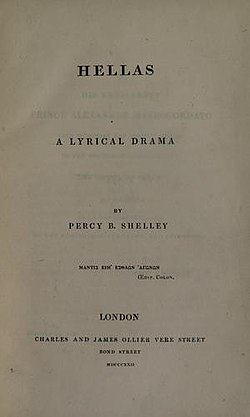Dedication
The dedication of the drama was: To Ηis Εxcellency Prince Alexander Mavrocordato late secretary for foreign affairs to the Hospodar of Wallachia the drama of Hellas is inscribed as an imperfect token of the admiration, sympathy, and friendship of the author. Pisa, November 1, 1821.
The Greek politician Alexandros Mavrokordatos met Shelley during his stay in Pisa from 1818 to 1821.
Analysis
The drama is written from the point of view of the Ottoman Sultan, and was inspired by Aeschylus' Persae .
The drama focuses on the Sultan, Mahmud, who controls the Turkish attacks on Greece. His sleep is restless and his mind worried by a recurring nightmare. He seeks help from the Wandering Jew, Ahasuerus, whom he believes has magic powers and can interpret his dream. During their conversation, Mahmud sinks more and more into despair as he, in spite of reports of Turkish victories, realizes that he has lost the war.
Alternating between the three dialogue parts is a chorus of enslaved Greek women, who furnish the drama with hope and aspirations for freedom's victory. Their participation is not directly connected to the insurrection of Greece, but rather expresses a universalized view of the futility of war.
The action is seen from the Turkish point of view, which makes it possible for Shelley to focus both on Turkish defeat, via Mahmud, and Greek victory, through the chorus. [2]
The last chorus from the drama contains the much-quoted stanzas:
- The world's great age begins anew,
- The golden years return,
- The earth doth like a snake renew
- Her winter weeds outworn:
- Heaven smiles, and faiths and empires gleam,
- Like wrecks of a dissolving dream.
- ...
- Oh, cease! must hate and death return?
- Cease! must men kill and die?
- Cease! drain not to its dregs the urn
- Of bitter prophecy.
- The world is weary of the past,
- Oh, might it die or rest at last! [3]
This page is based on this
Wikipedia article Text is available under the
CC BY-SA 4.0 license; additional terms may apply.
Images, videos and audio are available under their respective licenses.

